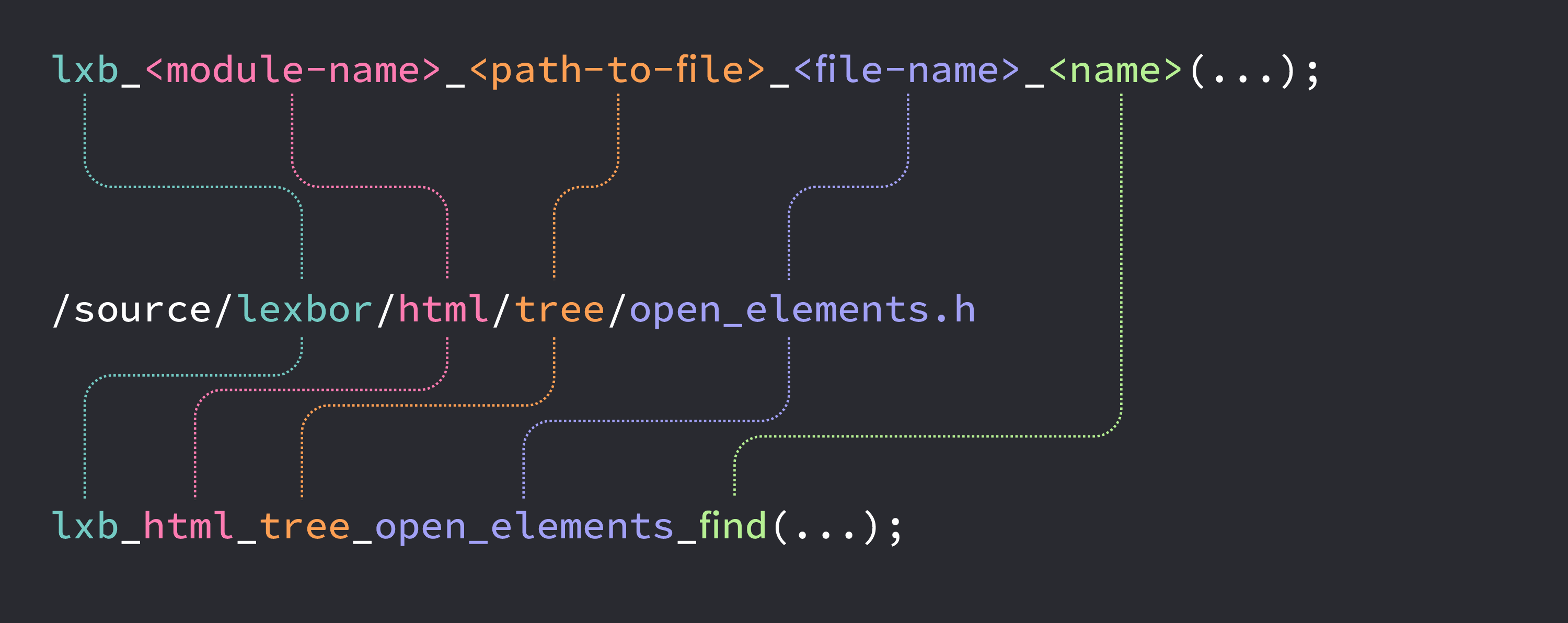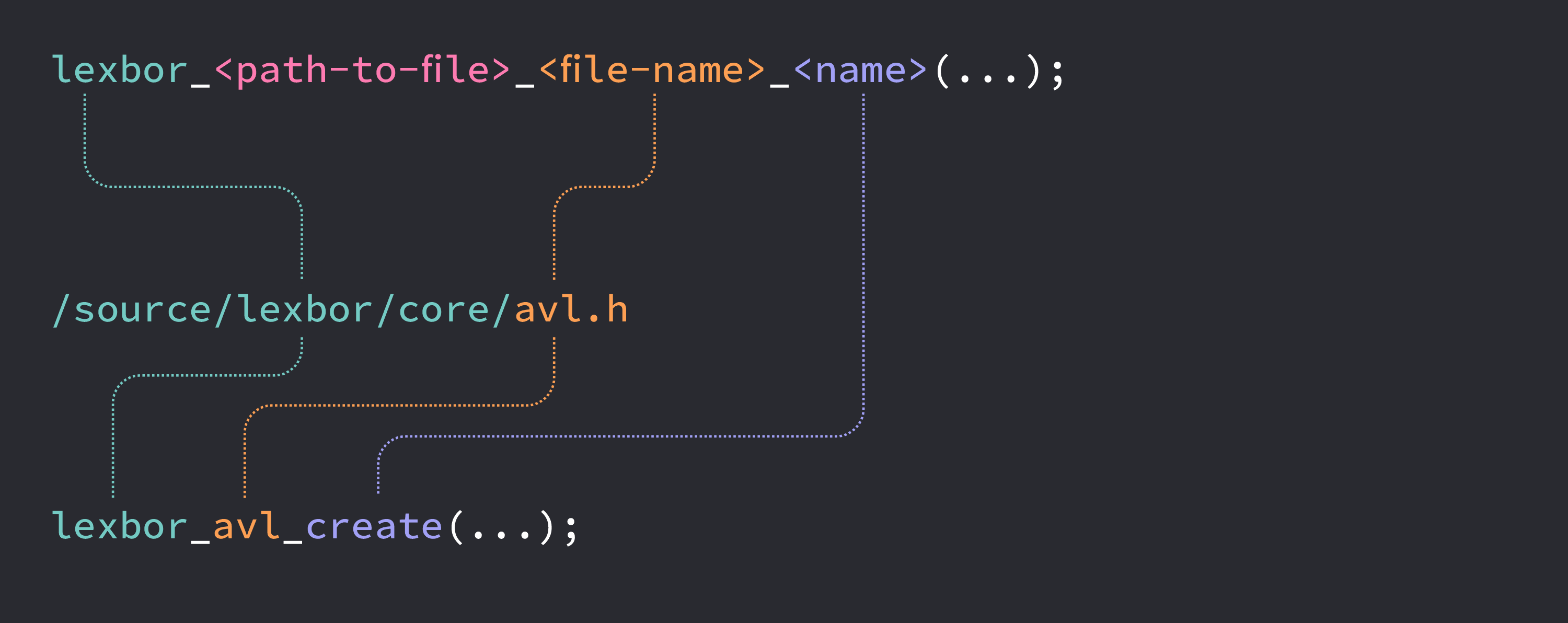Quick Start
These steps show how to use lexbor in your code;
they assume you have Linux and gcc.
Install
lexborlibrary in your system.Let's parse some sample HTML markup. Save this code as
myhtml.c:#include <lexbor/html/parser.h> #include <lexbor/dom/interfaces/element.h> int main(int argc, const char *argv[]) { lxb_status_t status; const lxb_char_t *tag_name; lxb_html_document_t *document; static const lxb_char_t html[] = "<div>Works fine!</div>"; size_t html_len = sizeof(html) - 1; document = lxb_html_document_create(); if (document == NULL) { exit(EXIT_FAILURE); } status = lxb_html_document_parse(document, html, html_len); if (status != LXB_STATUS_OK) { exit(EXIT_FAILURE); } tag_name = lxb_dom_element_qualified_name(lxb_dom_interface_element(document->body), NULL); printf("Element tag name: %s\n", tag_name); lxb_html_document_destroy(document); return EXIT_SUCCESS; }Compile
myhtml.cand run the resulting executable:gcc myhtml.c -llexbor -o myhtml ./myhtml
Installation
To install lexbor from binary packages, refer to the Download
section.
Source code
The source code is available on GitHub.
To build and install Lexborfrom source, use
CMake;
it's an open-source, cross-platform build system.
Linux, *BSD, macOS
At the project root:
cmake .
make
sudo make install
Optional flags recognized by the cmake command:
| Flags | Default | Description |
|---|---|---|
| LEXBOR_OPTIMIZATION_LEVEL | -O2 | |
| LEXBOR_C_FLAGS | Default C compilation flags.For details, see the port.cmake files in the ports directory. | |
| LEXBOR_CXX_FLAGS | Default C++ compilation flags. | |
| LEXBOR_WITHOUT_THREADS | ON | Reserved for future use. |
| LEXBOR_BUILD_SHARED | ON | Create a shared library. |
| LEXBOR_BUILD_STATIC | ON | Create a static library. |
| LEXBOR_BUILD_SEPARATELY | OFF | Build all modules separately. Each project module will have its own library (both shared and static). |
| LEXBOR_BUILD_EXAMPLES | OFF | Build examples. |
| LEXBOR_BUILD_TESTS | OFF | Build tests. |
| LEXBOR_BUILD_TESTS_CPP | ON | Build C++ tests. Tests verify the correct operation of the library in C++. Used with LEXBOR_BUILD_TESTS. |
| LEXBOR_BUILD_UTILS | OFF | Build project utilities and helpers. |
| LEXBOR_BUILD_WITH_ASAN | OFF | If possible, build with Address Sanitizer enabled. |
| LEXBOR_INSTALL_HEADERS | ON | Install library headers (all .h files). |
| LEXBOR_PRINT_MODULE_DEPENDENCIES | OFF | List dependencies between modules. |
Windows
Use the CMake GUI tool. For Windows with MSYS2:
cmake . -G "Unix Makefiles"
make
make install
Command Line Examples
We recommend building the project in a separate directory, which can be easily
deleted later, because cmake produces lots of clutter:
mkdir build
cd build
To build a debug version of lexbor with Address Sanitizer enabled:
cmake . -DCMAKE_C_FLAGS="-fsanitize=address -g" -DLEXBOR_OPTIMIZATION_LEVEL="-O0" -DLEXBOR_BUILD_TESTS=ON -DLEXBOR_BUILD_EXAMPLES=ON
make
make test
To build lexbor with tests:
cmake .. -DLEXBOR_BUILD_TESTS=ON
make
make test
sudo make install
To set the installation location (prefix):
cmake .. -DCMAKE_INSTALL_PREFIX=/my/path/usr
make
make install
To install only the shared library (without headers):
cmake .. -DLEXBOR_BUILD_STATIC=OFF -DLEXBOR_INSTALL_HEADERS=OFF
make
sudo make install
Code Samples
All code samples are available on the lexbor repo in the /examples/
directory.
To build and run the samples:
cmake .. -DLEXBOR_BUILD_EXAMPLES=ON
make
./examples/lexbor/html/element_create
./examples/lexbor/html/document_title
General Considerations
Our Approach: Dependencies, Algorithms, Platforms
The project is developed in pure
Cwithout external dependencies. Go hard or go home.We're not reinventing every algo known to humankind, but we approach object creation and memory management in our own way. Most classic algorithms
lexboruses are noticeably tweaked for the needs of the project.We're not averse to using third-party code, but it's often easier to start from scratch than incorporate an extra dependency (Node.js, we're looking at you).
A number of funcions are platform dependent, such as threading, timers, I/0, blocking primitives (spinlocks, mutexes). To help their implementation, a separate
portmodule exists; its structure and build rules differ from the other modules.
Memory Management
There are four major dynamic memory functions:
void *
lexbor_malloc(size_t size);
void *
lexbor_calloc(size_t num, size_t size);
void *
lexbor_realloc(void *dst, size_t size);
void *
lexbor_free(void *dst);
They are:
Defined in
/source/lexbor/core/lexbor.h(the core module)Implemented in
/source/port/*/lexbor/core/memory.c(theportmodule mentioned above)Open to redefining
As their names hint, they are intended as a replacement for the standard
malloc, calloc, realloc, and free functions. Unlike free, though,
the lexbor_free function returns a void * value which is always NULL;
this is some syntactic sugar to avoid explicitly nullifying free'd variables:
if (object->table != NULL) {
object->table = lexbor_free(object->table);
}
Otherwise, we would have to nullify object->table:
if (object->table != NULL) {
lexbor_free(object->table);
object->table = NULL;
}
We'll talk about other discrepancies later.
Status Codes
If a function can fail somehow, it should report the failure. We have two big rules when working with status codes:
If the status is
LXB_STATUS_OK(0), all is fine; otherwise, something went wrong.Always return meaningful statuses. That is, if memory wasn't allocated, the
LXB_STATUS_ERROR_MEMORY_ALLOCATIONstatus is returned, not a fake value such as0x1f1f.
Status codes are passed around as lxb_status_t. The typedef occurs
throughout the code and is defined in /source/lexbor/core/types.h; all
available status codes reside in /source/lexbor/core/base.h.
Function Naming
Almost all functions follow this naming pattern:

The exception is the core module (/source/lexbor/core/), which uses
the following pattern:

In other words, lexbor_* functions occur in the core module, full stop.
Header Locations
All paths are relative to the /source/ directory. For example, to include a
header file from the html module in the /source/lexbor/html/
directory: #include "lexbor/html/tree.h".
Data Structures
Most structures and objects have an API to create, initialize, clean, and delete them according to the following pattern:
<structure-name> *
<function-prefix>_create(void);
lxb_status_t
<function-name>_init(<structure-name> *obj);
void
<function-name>_clean(<structure-name> *obj);
void
<function-name>_erase(<structure-name> *obj);
<structure-name> *
<function-name>_destroy(<structure-name> *obj, bool self_destroy);
The
*_initfunction accepts any number of arguments and always returnslxb_status_t.Cleanup functions,
*_cleanand*_erase, can return any value, but usually it'svoid.If
NULLis passed as the first argument (object) to the*_initfunction, the function returnsLXB_STATUS_ERROR_OBJECT_NULL.If the
*_destroyfunction is called withself_destroyequal totrue, the returned value is alwaysNULL; otherwise,objis returned.The
*_destroyfunctions always check the object forNULL; if the object isNULL, the function returnsNULLas well.If the
*_destroyfunction wasn't passed thebool self_destroyargument, the object can only be created using the*_createfunction (i. e., not on the stack).
Typical usage:
lexbor_avl_t *avl = lexbor_avl_create();
lxb_status_t status = lexbor_avl_init(avl, 1024);
if (status != LXB_STATUS_OK) {
lexbor_avl_node_destroy(avl, true);
exit(EXIT_FAILURE);
}
/* Do something super useful */
lexbor_avl_node_destroy(avl, true);
Now, with an object on the stack:
lexbor_avl_t avl = {0};
lxb_status_t status = lexbor_avl_init(&avl, 1024);
if (status != LXB_STATUS_OK) {
lexbor_avl_node_destroy(&avl, false);
exit(EXIT_FAILURE);
}
/* Do something even more useful */
lexbor_avl_node_destroy(&avl, false);
Note that this approach is not an absolute must, even if ubiqutious. There are cases where a different API fits better.
Modules
The lexbor project is modular by design, and each module can be built
separately (at least potentially). Modules can depend on each other; for
example, now all modules rely on the core module.
Each module is a subdirectory in the /source/ directory of the project.
Versions
Each module stores its version in the base.h file at the module root. For
example, with /source/lexbor/html/base.h:
#define <MODULE-NAME>_VERSION_MAJOR 1
#define <MODULE-NAME>_VERSION_MINOR 0
#define <MODULE-NAME>_VERSION_PATCH 3
#define <MODULE-NAME>_VERSION_STRING LXB_STR(<MODULE-NAME>_VERSION_MAJOR) LXB_STR(.) \
LXB_STR(<MODULE-NAME>_VERSION_MINOR) LXB_STR(.) \
LXB_STR(<MODULE-NAME>_VERSION_PATCH)
Core Module
This is the base module; it implements all algorithms that are essential for the project, such as AVL and BST trees, arrays, strings and so on. It also implements memory management. The module is continually evolving. New algorithms are being added; existing ones, optimized.
The documentation for this module will be available later.
DOM
This module implements the DOM specification. Its functions manipulate the DOM tree: its nodes, attributes, and events.
The documentation for this module will be available later.
HTML
This module implements the HTML specification.
Implemented now: Tokenizer, Tree Builder, Parser, Fragment Parser, Interfaces for HTML Elements.
The documentation for this module will be available later. For guidance, refer to the examples.
Encoding
This module implements the Encoding specification.
Implemented now: streaming encode/decode. Available encodings:
big5, euc-jp, euc-kr, gbk, ibm866, iso-2022-jp, iso-8859-10, iso-8859-13,
iso-8859-14, iso-8859-15, iso-8859-16, iso-8859-2, iso-8859-3, iso-8859-4,
iso-8859-5, iso-8859-6, iso-8859-7, iso-8859-8, iso-8859-8-i, koi8-r, koi8-u,
shift_jis, utf-16be, utf-16le, utf-8, gb18030, macintosh, replacement,
windows-1250, windows-1251, windows-1252, windows-1253, windows-1254,
windows-1255, windows-1256, windows-1257, windows-1258, windows-874,
x-mac-cyrillic, x-user-defined
The documentation for this module will be available later. For guidance, refer to the examples.
CSS
This module implements the CSS specification.
The documentation for this module will be available later. For guidance, refer to the examples.